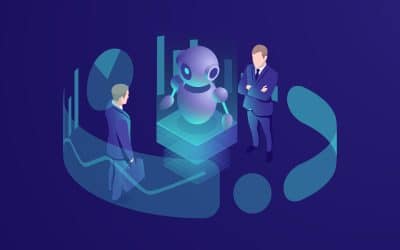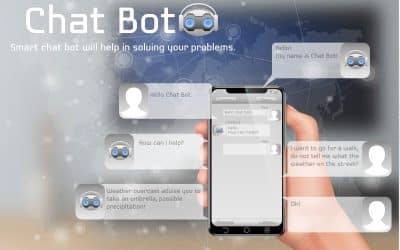Even though Artificial intelligence is blamed for displacing thousands of people with its automatic capabilities, it also allows individuals to pursue careers that promise great rewards in data science. The market is booming for Hiring AI Engineers who can conduct the most cutting-edge technology and research. However, AI experts are not in quantity – which has been improving steadily due to the new master’s and Ph.D. programs in machine learning created across the globe over the last few years.
Studies show that demand for AI-related jobs has steadily increased. This suggests that in the coming six years, AI technology will be able to perform 71% of regular job tasks, and that’s why nearly half of businesses expect to employ people with AI-related skills over the coming years.
However, attracting artificial intelligence talents is more complex than sourcing traditional expertise in software development. Because artificial intelligence is relatively new and developing, it can be hard to distinguish individuals solely based on their education and experiences. Employers should instead be looking for specific skills and traits that can be particularly useful in projects that rely on artificial intelligence that are experimental and exploratory.
Before Hire AI Generative Engineers, be sure you understand the basic principles to be aware of when you employ an AI specialist to be part of your team.
What Does An AI Engineer Do?
An AI engineer creates AI models composed of ML algorithms to gain business insight that could inform decision-making within their entire organization. They also build weak and strong AIs, depending on their objectives. AI engineers are well-versed in programming, the software engineering process, and data science. They utilize various technologies and tools to ensure they can analyze data and develop and manage AI software.
AI engineers create various AI applications, such as contextual ads based on emotion analysis, visual detection or perception, and language translation. The subsequent part of How to be an AI Engineer focuses on AI Engineers’ roles. AI engineer.
Things To Think About When You Are Hiring AI Engineers
Hiring a software engineer is a job that has been around for a long time and needs to be more challenging. How do employers select candidates for the recent (and highly sought-after) AI engineering job? Most importantly, those who are considered for this position need to have a solid comprehension of computer science concepts that heavily emphasize AI-related technology and methods. Being familiar with different AI models, algorithms, and data models is essential.
Determining the candidates’ practical experience in implementing AI methods is also essential. Find projects or previous works that prove their capability to use AI concepts successfully in real-world situations. Or assess these capabilities through the assessment and interview method. The practical skills required for AI development are as essential as knowledge of the theory.
The ability to solve problems and communicate are essential qualities to search for when Hire AI Engineers. It is the nature of AI projects often to tackle complicated, unimaginable issues. Thus, solving problems with solid abilities is essential for AI engineers to develop and modify solutions efficiently. They need to be skilled at identifying the root of complex issues to develop solutions and reworking their ideas for optimal results.
Additionally, they must be able to convey these complicated ideas and their solutions to a range of people. Communicating effectively is essential for working in teams and explaining AI concepts and their impacts to non-technical stakeholders. An experienced AI engineer can excel on the technical side of AI and communicate their thoughts and ideas simply and understandably while bridging the divide between the technical and non-technical worlds.
What To Consider When Hiring AI Engineers
The key strength of an AI engineer lies in their advanced understanding and practical application of machine learning algorithms. From basic computational models such as linear regression and decision trees to more advanced ones such as convolutional neural networks (CNNs) and Recurrent Neural Networks (RNNs), engineers who possess extensive knowledge of these models are equipped to craft intelligent and prescriptive solutions that address a host of business issues.
An engineer in machine learning evaluates analyses, analyzes, and categorizes massive quantities of data when executing tests and optimizing ML methods and machines.
To be an AI engineer specializing in machine learning, proficiency in specific algorithms and statistical techniques is crucial. They must be adept at various machine learning methods, such as classification, regression, clustering, and decision trees. Familiarity with the neural network’s architecture, specifically in fields like deep learning, is vital. This is a prerequisite for understanding the subtleties of different networks like convolutional neural networks (CNN) to process images or recurrent neural networks (RNNs) to analyze sequences.
The ability to master the most critical machine learning frameworks, such as TensorFlow or PyTorch, is essential because they are the most important tools for creating and using machine learning models. In addition, AI engineers should be able to analyze and understand data practically, as well as refine and improve models by knowing and utilizing the appropriate performance indicators. These skills will ensure that Hire AI Engineers aren’t just skilled in creating sophisticated machine learning algorithms but also adapt and develop to keep pace with the changing field.
For example, Imagine a health establishment that aims to improve patient treatment by predicting disease progression. An AI engineer skilled in machine learning algorithms may use sequential models such as RNNs to study past patient records, anticipate possible complications, and suggest customized treatment plans.
Knowledge Of Data Structures and Algorithms
Data structures and algorithms create the foundations for data manipulation and processing. An AI engineer with experience managing and optimizing data structures such as connected lists and hash tables and expertise in algorithmic problem solving can create AI models that provide the highest performance and capacity.
Example: A major retailer trying to upgrade its recommendation engine may profit from AI engineers who use sophisticated algorithmic and data structures to effectively manage vast quantities of customer information and deliver immediate, personalized product recommendations.
Critical Thinking and Problem-Solving Skills
The most important skills to be looking for essential qualities when you are in the process of hiring AI engineers are their problem-solving skills and thinking skills. These abilities are vital for success in the AI industry, as engineers often face complex, sometimes novel issues that need creative strategies. A successful AI engineer needs to be able to be analytical, break down issues into manageable parts, and form intelligent, productive solutions. They must be skilled in algorithms and be able to design and develop algorithms to solve problems efficiently and improve AI models.
Critical thinking is essential for assessing AI solutions’ potential and feasibility impacts. It is crucial to consider the ethical and technical aspects. The ability to identify, anticipate, and fix potential problems with AI systems to guarantee robust and stable operation. Since the field is constantly evolving, the capacity of AI engineers to adjust and improve their problem-solving skills to the latest methods and technologies can be precious. They can drive innovation by ensuring AI solutions are created using foresight, precision, and ethical responsibility.
Navigating Ethical and Regulatory Challenges
The AI world is marked with regulatory and ethical challenges. Hire Artificial Intelligence Engineers who are flexible can address these issues, ensure their strategies align with ethical principles, and adhere to privacy laws. For instance, a bank uses AI to assess credit risk. AI engineers constantly check and improve the model to eliminate bias and ensure that lending practices are fair and according to financial laws.
It is a matter of adaptability and continuous learning. The wings that permit AI engineers to excel in the constantly changing AI world. By embracing new technologies, keeping pace with trends, participating in AI communities, and adhering to ethics and legal compliance, these engineers begin an endless development and learning journey.
Experience With Deep Learning Frameworks
Deep learning, a part of machine learning, can enable AI engineers to decipher intricate patterns in structured information. Engineers can build deep neural networks using deep learning frameworks such as TensorFlow and PyTorch. These frameworks allow the network to tackle challenges related to the natural processing of languages and many others.
A study found that TensorFlow and PyTorch are the most popular deep learning tools among researchers and AI engineers, with TensorFlow having a slight advantage in popularity.
Example: A car company looking to improve its vehicle’s perception can count on AI engineers who have mastered deep learning systems to create advanced convolutional neural networks to detect and interpret traffic signs, pedestrians, and other items on the roadway. Technical knowledge and programming skills constitute the basis for AI engineering.
An AI engineer’s expertise in machine learning algorithmic algorithms, programming languages, data structures, and deep learning frameworks allows the AI engineer to harness its power to solve various issues across different sectors.
Demonstrated Experience In Troubleshooting AI Models
In the tumultuous world of AI, the ability to troubleshoot is essential. AI engineers adept at detecting problems in AI models guarantee the stability and accuracy of their methods, thus reducing risks and ensuring consistency in efficiency.
An example: A startup specializing in natural language processing needs help with its chatbot’s accuracy. An expert AI engineer studies the model’s flaws, refines its data for training, refines the model’s architecture, and creates chatbots that provide precise and relevant answers.
Data-Driven Decision-Making Skills
In an era of AI, data is the blood that feeds AI-driven systems. AI experts with knowledge of data-driven decision-making leverage the information gleaned from data analysis to help make educated decisions about selecting models, tuning hyperparameters, and optimizing, eventually providing the best AI solutions.
Relevance of Industry-Specific Expertise for AI Projects
Knowledge of domains is the keystone for AI engineers when working on AI projects tailored to specific sectors. Engineers with a deep knowledge of health, finance, manufacturing, or another area will be better able to detect opportunities, identify challenges, and create AI solutions that meet industry demands.
An example is the energy industry. In the energy sector, an AI engineer with deep domain expertise collaborates with a renewable energy firm to improve the efficiency of wind farms. Their knowledge of wind patterns, energy generation, and grid integration results in creating a predictive maintenance system, decreasing downtime while maximizing energy production.
Understanding Business Objectives and Translating Them to AI Solutions
AI engineers who have industry expertise can translate business objectives into AI-driven plans. In absorbing the complexities of an organization’s strategies and goals, They create AI models that provide actionable insight, improve efficiency, and promote creativity.
Based on a research study, companies that have begun their AI initiatives are seeing improvement in their business performance between 17% and 24% in the present.
Example: A significant e-commerce company seeks to increase customer satisfaction with personalized recommendations. An AI engineer with experience in retail designs a recommendation engine that considers customer behavior, past purchases, and seasonal trends. This results in an impressive rise in customer engagement and conversion rate.
Previous Experience In Similar AI Applications
The industry-specific knowledge gives AI Developers the expertise gained from prior AI applications in similar fields. By leveraging the lessons from previous initiatives, AI engineers can improve AI models, avoid pitfalls, and accelerate the development of innovative solutions.
Example: A medical institution is trying to identify the early symptoms of a disease via medical imaging. An AI engineer with previous knowledge of Medical imaging AI applications can fine-tune the convolutional neural networks (CNN) design, leading to more accurate detection of abnormalities.
Soft Skills
We all worry about filling our resumes with high-quality abilities. We review our schooling and work experience to determine the lessons we’ve learned. While these talents attract employers, they’re interested in more than that. They’re also searching for AI capabilities that are difficult to examine using pencil and paper—or, in this instance, computers.
Soft skills are fundamental abilities that impact how you work. They influence how you interact with coworkers and work. Soft skills can help you apply and combine your acquired hard skills.
These AI capabilities are crucial for careers in this field; you should pay particular attention to your emotional intelligence. Why? AI’s purpose is to imitate human behavior. While humans can recognize different cues, such as changes in facial expressions and voice speech, AI can’t do that alone. It’s the responsibility of those of you who are involved in AI development to design your AI to detect these traits of humans.
Programming Languages AI Engineers Should Know
Most of the time, an AI developer’s duties are traditional data engineering and coding. This means that your top goal should be to find skilled engineers with strong programming skills who are proficient with one or more of these programming languages
Python is a highly accessible high-level programming language ideal for machine learning development due to its ease of use and coherence, offering numerous frameworks and libraries dedicated to this area, such as TensorFlow, PyTorch, and sci-kit-learn that make creating models simpler than ever.
C++ and C++ Are other popular options. Because they provide low-level control, C and C++ are frequently used in computation-intensive tasks or in creating systems where performance is crucial.
Java/Scala is frequently employed in enterprise software, large-scale software development, and distributed technology. Java and Scala are associated with the Big Data Era and are less relevant to many AI applications today.
R is a programming environment and language for visualizing and computing statistical data. It is extensively used for data analyses. R also has several frameworks and libraries that support the ML field, including caret, mlr, and randomForest.
How Do You Evaluate AI Engineers
Evaluating AI engineers as part of the selection procedure requires planning and an in-depth understanding of the needs and qualifications for the job. Begin with a pre-screening for the job, ensuring applicants have the essential technical abilities for the AI engineer position.
At later stages of recruitment, tech-related interviews must include questions based on theory and practical problems, with live programming sessions or assignments for take-home to evaluate the candidates’ coding skills and ability to solve problems in real-time. Incorporating questions based on scenarios and reflecting on real-world situations is beneficial since it reveals the applicant’s method of problem-solving and creativity. The behavioral interviews will help assess their interpersonal skills and ability to work in teams or handle conflict, essential skills required for collaboration projects.
The most frequent issue when evaluating AI engineer candidates is that the interviewers might need to focus more on their theoretical information while ignoring candidates for their skills in the real world. Interviewers need to ensure the evaluation of the quality of interpersonal abilities, including communication, adaptability, and continual learning. AI projects typically need cross-functional collaboration and continuous training in a constantly evolving area.
Conclusion
Hiring an AI specialist and ensuring you’ve chosen the right one is an important decision that companies must not take lightly. This is especially true when hiring the right person to support your business. The company is ahead of constantly evolving technology, such as AI.
It is essential to find an individual who can positively impact your company and assist in moving it to the next stage. Look for skills, an academic background, and experiences demonstrating expertise and knowledge in this field. Remember the importance of soft abilities.











